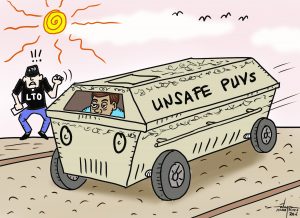BY SHAINA MAEGANE M. GONZALES
THE ARREST of former President Rodrigo Roa Duterte on March 11, 2025, made me realize just how deeply politics divides Filipinos. In social media alone, I’ve seen friendships fall apart, families argue, and even close relationships become strained over political beliefs. It feels like politics has become so personal that people refuse to associate with those who support opposing sides.
I think this division stems from a lack of political education early in life. Many of us grow up engaging in heated debates without fully understanding governance, democracy, or civic responsibility. Without a strong foundation, discussions often turn into emotional arguments rather than meaningful conversations. It makes me wonder: Should we start teaching politics earlier to help create a more informed and open-minded society?
I saw just how much politics influences even young children. Just recently, while walking near my cousin’s house, I passed by a group of kids, maybe 8 to 10 years old, playing outside. As I approached, they suddenly blocked my way and asked, “Duterte ka, ate? Or Marcos?” The question caught me off guard.
Before I could even answer, someone else ahead of me did, and the kids immediately cheered, shouting the name of their chosen politician—“Duterte! Duterte!” They treated it like a game, as if supporting a politician was like rooting for a basketball team rather than choosing a leader who would shape their future.
These kids probably didn’t even understand politics, yet they had already picked sides based on what they heard at home or online. That moment made me realize how early political biases start and how difficult it can be to change perspectives later on. Without proper education, many people grow up with a one-sided view, making it harder to think critically and have meaningful discussions.
However, some lessons about “politics” are briefly covered in Araling Panlipunan. I think it’s not enough. Since many Filipinos don’t attend college, a large portion of the population never receives formal education on governance, democracy, or civic responsibility. Not everyone takes Political Science, and by the time students reach high school or college, many already have strong political opinions shaped by their families, communities, or social media. At that stage, it becomes more difficult to introduce critical thinking skills that could challenge or refine those perspectives.
This is why I believe that waiting until high school or college to teach politics is too late. If we begin political education as early as elementary school, children can learn early on about government systems, the importance of voting, and the value of respecting different viewpoints. Rather than simply adopting their parents’ beliefs, they could start analyzing political issues for themselves, which encourages independent thinking and promotes a culture of informed decision-making.
If the Philippines started this kind of approach, it could really help improve how people understand politics and take part in civic activities. Teaching politics at a young age would give children the skills to check facts, listen to different opinions, and talk about issues in a calm and respectful way. This might lessen the spread of wrong information and stop political talks from turning into emotional arguments.
Of course, early education won’t fix political problems right away, but it can help raise a generation that values thinking clearly, having open conversations, and joining in on democratic processes. Over time, this could lead to a more thoughtful, responsible, and active society. So, should we let elementary students learn about politics?
—————————————————————————–
Shaina Maegane M. Gonzales is a political science student at the University of Cebu-Main Campus. This piece is part of their course requirement.

